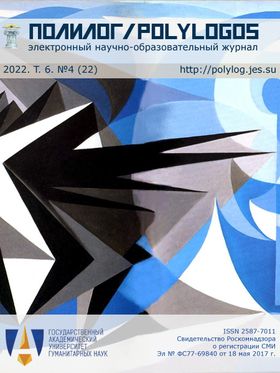
Share
The fourth issue of the journal «Полилог/Polylogos» for 2022 published articles on theoretical and applied political science, political psychology, social philosophy and other areas of social and humanitarian knowledge.
The subject of the article by Mikhail Loktionov is the formation of the philosophical views of Anatoly Lunacharsky. The "Nietzschean empirio-criticism" of the philosopher and politician is considered in the broader context of Russian positivism and empirio-criticism. The article by Denis Letnyakov considers the phenomenon of an agonistic (competitive) model of democracy: in particular, the author reflects on what an agonistic alternative to the “electoralist” approach to democracy, linking the latter primarily with the holding of competitive elections, may consist of. The article by Vadim Podolsky provides an overview of existing approaches to the analysis of the impact of trust on political processes; definitions of trust and approaches to its measurement are given, theories related to the sphere of trust are considered, and the context and options for the impact of trust on political processes are described. Alexander Fedorov in his article refers to such phenomena as “hybrid threat” and “hybrid war”: the author notes that at present these terms are not sufficiently clarified in political science, and their use often has a propagandistic rather than strictly scientific character. In the article by Elena Khlyshcheva, state educational standards and strategies for the development of education are analyzed in a comparative manner on the example of Russia and Kazakhstan; the main tendencies of approaches to the formation of identity in educational programs are revealed.
The issue contains the second part of Maria Rakhmaninova's study on the role of women in the development of libertarian pedagogy: the author made an attempt to introduce new significant figures into the Russian-language corpus of knowledge; the trajectory of the development of libertarian pedagogy in the 20th century is outlined. The article by Irina Morozikova and Nina Rozanova analyzes the psychological features of the reputational image of the Russian authorities in general and the regional executive authorities in particular, using data from sociological studies. The article by Lev Mysovskikh examines the features of the manifestation of the phenomenon of conformism from the point of view of social psychology and social philosophy. In turn, Evgeny Lozhkin explores a number of aspects of the influence of Swedish constitutionalism on Russian politics at the end of the 18th century, coming to the conclusion that it is appropriate to interpret the relevant political and cultural context within the framework of the “Russian Northerness” model.
